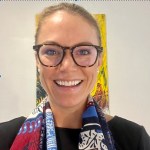Until recently, we haven’t had a dedicated and transparent process for participating in and contributing to reconciliation and equality for Indigenous Australians. But it’s no longer acceptable for businesses to stand on the sidelines of social injustice — we are addressing this gap in our drive for equality. And we want to invite other organisations to join us on this journey.
We don’t have all the answers but we see social injustice around the world — businesses must lead by example in addressing it with transparency, and be held to account for their commitments and actions.
This will take time and collaboration, as well as gathering learnings, shared insights, and expertise of Indigenous and Torres Strait Islander communities. But we don’t want to be bystanders when it comes to reconciliation. It’s well and truly time for us to step up to meet the moral imperative — to fully take part in this most important and valuable endeavour.
We want to be part of that journey and that future. And to do that, we are creating our first RAP.
What is a RAP?
A RAP — or Reconciliation Action Plan — is a strategic document that lays out how an organisation will support the national reconciliation movement. Through measurable, action-focused contributions to reconciliation both internally and in the wider community, a RAP is an organisation’s pathway to developing respectful relationships and meaningful opportunities with Aboriginal and Torres Strait Islander peoples.
Why have a RAP?
Organisations across Australia are developing RAPs to build positive and productive relationships with Aboriginal and Torres Strait Islander peoples. We are proud to collaborate on opportunities that will improve the socio-economic opportunities of people who have been marginalised on every front.
With Reconciliation Australia’s tried and tested framework, and a wealth of resources available, organisations are in a better position than ever to formalise their commitment to equality.
Even aside from the fact that pursuing equality is the right thing to do, equality also benefits businesses. With a RAP, an organisation is far more likely to have the culture of trust that is critical to successfully recruiting and retaining Indigenous Australians. Businesses that have developed a RAP stretch their cultural capabilities to provide a safe and welcoming environment for interns and new recruits.
“If young people don’t feel welcome and trusted, they just won’t stay,” CareerTrackers Director of Learning Adam Davids told us at Salesforce LIVE ANZ earlier this year.
A RAP is for any organisation that wants to move beyond good intentions and dive into practical, supported, success-driven outcomes.
Our RAP journey, our equality journey
This RAP is a vital milestone in our equality journey. For the past year, we’ve been working with PWC Indigenous Consulting, as well as Supply Nation and CareerTrackers, to develop a robust, actionable RAP. We submitted our first draft to Reconciliation Australia at the end of 2019 and anticipate going through another three to four phases before it’s approved and ready to implement.
In our RAP, we look at ways to become outspoken, useful allies to Aboriginal and Torres Strait Islander communities and how to use our strengths to create meaningful opportunities both within Salesforce and in the wider community for Aboriginal and Torres Strait Islander peoples.
Equality is absolutely a journey — we’re on it, and we have work still to do. Following our 1:1:1 model, we aim to share our resources and partner with organisations best positioned to help drive the goals of reconciliation. Empowering our community of employees, partners, customers and suppliers, and maintaining a workplace culture that supports reconciliation goals, are critical to our efforts.
We are excited to have launched WINDForce in Australia earlier this year — an employee resource group dedicated to sharing, celebrating and respecting indigenous peoples and their cultures, as well as to championing self-determination, truth-telling, and economic and technological advancement.
In our ongoing work with CareerTrackers and TupuToa, we strive to develop a workplace in which indigenous people feel welcome and valued. We’d be mad not to — 89% of CareerTrackers students reach graduation, 95% of alumni are in full-time employment within three months of graduation, and 68% are rated as top performers in their most recent workplace evaluations.
We are committed to making the changes needed to contribute to reconciliation.
Pip Marlow is Chief Executive Officer, Salesforce Australia and New Zealand. Read more from Pip.






















